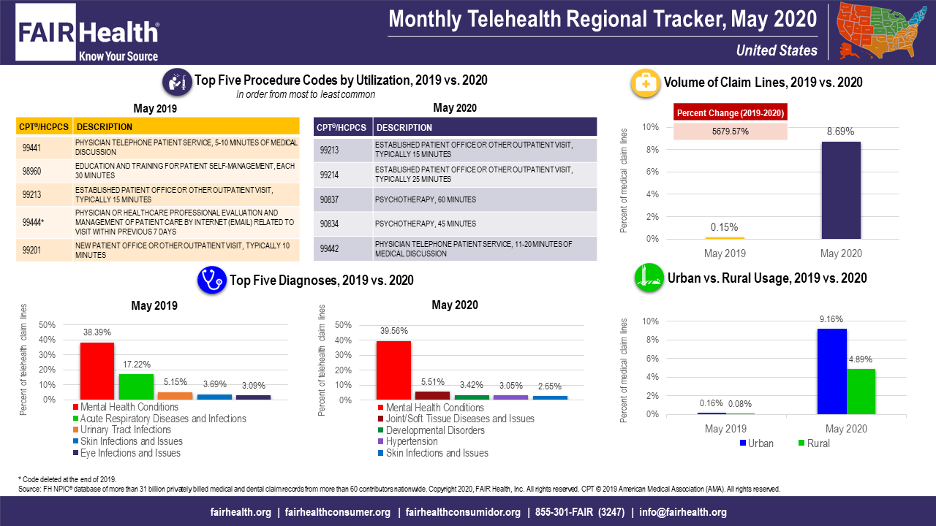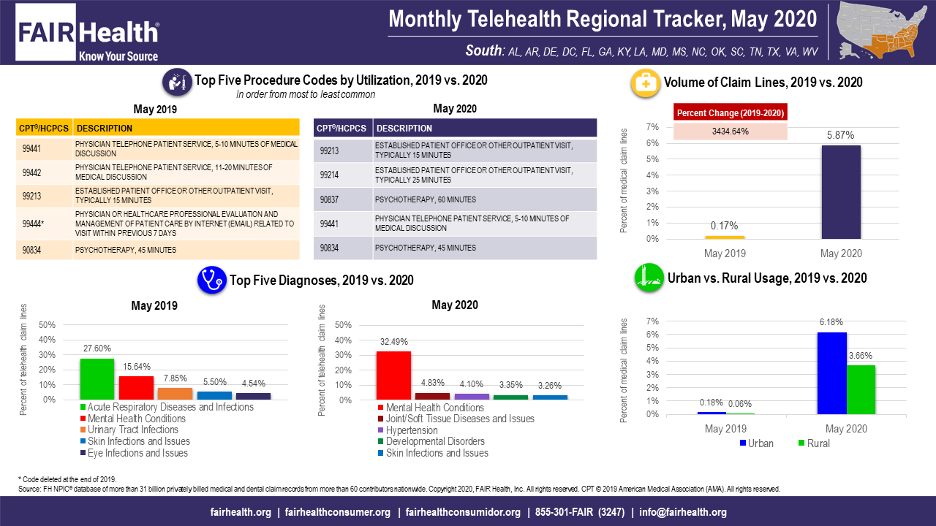- Center on Health Equity & Access
- Clinical
- Health Care Cost
- Health Care Delivery
- Insurance
- Policy
- Technology
- Value-Based Care
Telehealth Growth in May Rises Year to Year, but Drops Month to Month
Robin Gelburd, JD, president of FAIR Health, discusses telehealth growth in May medical claims.
Telehealth claim lines increased 5680% nationally from 0.15% of medical claim lines in May 2019 to 8.69% in May 2020, according to new data from FAIR Health’s Monthly Telehealth Regional Tracker (Exhibit 1). Although substantial, that increase was less than the year-to-year increase the previous month, when telehealth claim lines increased 8336% nationally from 0.15% of medical claim lines in April 2019 to 13.00% in April 2020. The data represent the privately insured population, excluding Medicare and Medicaid.
Exhibit 1. Monthly Telehealth Regional Tracker, May 2020, United States

(Source: FAIR Health)
Against the backdrop of the year-to-year increase, telehealth claim lines fell 33% nationally from 13.00% of medical claim lines in April 2020 to 8.69% in May 2020.
The 4 US census regions (Midwest, Northeast, South and West) all showed trends similar to the nation as a whole. In each region, there were large percent increases in volume of claim lines from May 2019 to May 2020 (Exhibit 2), but these increases were smaller than the increases from April 2019 to April 2020.
Exhibit 2. Monthly Telehealth Regional Tracker, April 2020, South

(Source: FAIR Health)
In addition, in each region, there was a drop in volume of claim lines from April to May 2020. The biggest drop was in the South, where the decrease from April to May was 40%, from 9.81% of medical claim lines to 5.87%.
Higher telehealth utilization from March to May 2020 by comparison with the same months in 2019 suggests the impact of the COVID-19 pandemic. In March and April, many states prohibited elective procedures and non-emergency medical care when rendered in person, making telehealth an attractive alternative. Many of these prohibitions expired in May as states began to open up, perhaps accounting for the drop in the telehealth share of total medical claim lines that month relative to April. Nevertheless, the pandemic continued and telehealth usage remained high by comparison with 2019.
Other notable findings of the Monthly Telehealth Regional Tracker concern the top 5 telehealth diagnoses:
- Mental health conditions, already the number 1 telehealth diagnosis nationally and in every region in April 2020, accounted for an even larger share of telehealth claim lines in May 2020. Nationally, this diagnosis increased from 34% to 40% of telehealth claim lines from April to May 2020. In May 2020, it constituted 40% or more of telehealth claim lines in every region but the South, whereas in April 2020 it did so only in the Midwest.
- In May 2020, developmental disorders ranked among the top 5 telehealth diagnoses in all regions and nationally, whereas in April 2020 this diagnosis was in the top 5 in only one region (the West). In May 2019, it was not in the top 5 in any region. The COVID-19 pandemic appears to be driving the movement toward more use of telehealth in this area.
Launched in May as a free service, the Monthly Telehealth Regional Tracker uses FAIR Health data to track how telehealth is evolving. An interactive map of the 4 US census regions allows the user to view an infographic on telehealth in a specific month in each region, or in the nation as a whole. In addition to data on the volume of claim lines and on diagnoses, each infographic includes findings on urban versus rural usage and the top five telehealth procedure codes.
FAIR Health is a national, independent nonprofit organization dedicated to bringing transparency to healthcare costs and health insurance information.
COVID-19 is having a pronounced impact on telehealth, but the specifics of that impact vary from month to month. FAIR Health’s Monthly Telehealth Regional Tracker is showing in detail how this venue of care is evolving.
About Robin Gelburd, JD, president of FAIR Health
Robin Gelburd, JD, is the president of FAIR Health, a national, independent nonprofit organization with the mission of bringing transparency to healthcare costs and health insurance information. FAIR Health possesses the nation’s largest collection of private healthcare claims data, which includes over 31 billion claim records contributed by payors and administrators who insure or process claims for private insurance plans covering more than 150 million individuals. Certified by CMS as a national Qualified Entity, FAIR Health also receives data representing the experience of all individuals enrolled in traditional Medicare Parts A, B and D; FAIR Health includes among the private claims data in its database, data on Medicare Advantage enrollees. Ms. Gelburd is a nationally recognized expert on healthcare policy, data and transparency.
